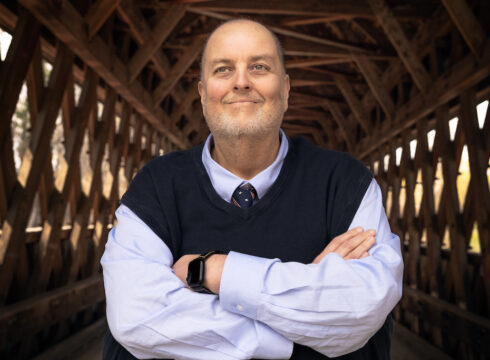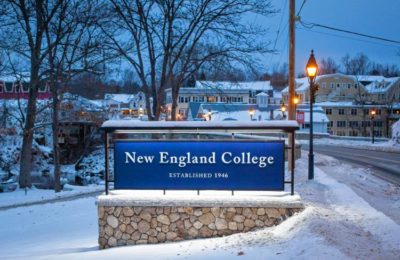Learn More
Apply to NEC
Explore Academic Degree Programs
Read More NEC News
New Hampshire Magazine: Meet Dr. Wayne Lesperance, New England College’s First Hispanic President

February 6, 2024, by Beth Santos
Read on New Hampshire Magazine‘s website.
If you had asked Dr. Wayne Lesperance 25 years ago where he thought he would end up in his career, college president was one of the last things he would have predicted.
Instead, he might have suggested something a little more laid back: a political science professor at a school near the ocean, maybe. Working at a beach bar in his off-hours, cracking open a beer with friends, or going to a concert in the late evenings. Yet becoming New England College’s 16th president, and first Hispanic president, has become not just a career but a mission in helping more Hispanic students find grounding, support and earn a university degree.
“I didn’t aspire to be a college president,” says Lesperance, who was born in Puerto Rico and raised in Virginia.
When the university needed to temporarily fill an unexpected vacancy and approached him—a poly sci professor who was inspired to move to New Hampshire to get closer to the state’s first-in-the-nation political status—he expected to work in administration for two weeks.
Six years later, he has just completed his first year in as the college’s 16th president, and he is loving every minute of it.
“Being in the classroom with students is my passion,” he says. “But as a teacher, I get to affect 20 to 25 students at a time. As an administrator, I’m helping 60 to 70 faculty members who are working with 20 to 25 students at a time. So, on a macro level, it’s more impactful.”
That impact comes at a time when NEC’s own demographics are changing and becoming more diverse.
“When I first got here, NEC was a college that attracted a lot of students that had the resources to go to Ivy League institutions but didn’t have the grades. And we were overwhelmingly white and male,” Lesperance says. “There was a lot of privilege at NEC.”
Over time, he’s witnessed “a real democratization” of the student body.
“We are much more representative of everyday American kids and international students as well. So, seeing that diversity of background come in, whether it’s racial, ethnic, gender equity coming in… it’s a very rewarding and relevant change,” he says. “For no other reason, it changes what happens in a classroom. When you have people in a classroom that have different life experiences, different values, different religions, different origin stories, it’s enriching, it makes every conversation in a classroom that much better. I’m proud that this community embraces that.”
Seeing more on-campus diversity, especially in race and socioeconomic background, is close to Lesperance’s heart. Knowing that his own story very closely resembles that of many of his students gives him the unique opportunity to create support systems that work for them as well as their families.
“Today, about 33% of our students are students of color, and that includes an awful lot of Hispanic students. I was the first kid in my family to go to college,” Lesperance says. “Education was incredibly important to my grandparents and parents, and sending me to college was sort of a community effort by the family.”
That family effort continued as Lesperance pursued graduate work.
“When I was encouraged by my professors to go on to get a master’s degree and eventually get a doctorate, I shared that with my family, and the family all came together and said, ‘We’re going to help you with this.’ And they did. So, my success is their success,” Lesperance says.
“There are a lot of families like mine that don’t have a lot of money or a history of educational attainment, especially at the graduate or doctoral level. And to be able to talk about that, as somebody who came from that background, I think it’s encouraging for others to pursue those opportunities.”
Knowing intimately what his students are going through makes Lesperance’s work feel all the more relevant.
“I like to talk about how hard it is, the work that’s involved in it, the importance of that commitment. But ultimately, I think what really resonates, especially with Hispanic families, is the role of family,” Lesperance says. “When I encountered a difficult moment, or I started second-guessing whether or not this was for me, there were those family members that either offered encouraging words or a kick in the butt. And I appreciated that.”
Making sure students are activating their support network and that families are understanding their role in making higher education an option is a key component of Lesperance’s hope to grow the university from 3,500 to 5,000 students over time.
“A lot of colleges are in survival mode,” he said. “I’d like to get to a place where we’re thriving. So, 100 years from now, we’re still here and doing really great innovative things long after I’m gone,” Lesperance says.
As new students come in from more diverse backgrounds, Lesperance has watched how much the wider community of locals has embraced them, and sees that as a template for more tolerance in a changing New Hampshire.
“The more diversity we see in New Hampshire, the better off our state is. As we talk about real issues and real concerns that we have as Americans and as members of communities, having those voices in to help us understand different perspectives, it makes us better,” he says.
“It makes us smarter. It makes us stronger. I think that we’re seeing a lot of that already. And hopefully more will follow.”
This article is featured in the spring 2024 issue of 603 Diversity.
603 Diversity’s mission is to educate readers of all backgrounds about the exciting accomplishments and cultural contributions of the state’s diverse communities, as well as the challenges faced and support needed by those communities to continue to grow and thrive in the Granite State.
More stories from 603 Diversity.
Order a copy of the print edition.
###





